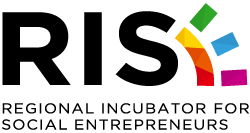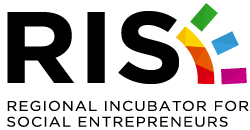Marija Burgieva and Marko Vasilev are from North Macedonia. With Lepa Simonovska, they co-founded Okrug, a circular startup that converts orange peels into products such as natural essential oils and air fresheners.
While working on this social enterprise, Marija is finishing her bachelor in international politics and diplomacy. Marko and Lepa are respectively students in law and computer sciences. Okrug is also supported by volunteers from diverse backgrounds, who share a common goal of reducing waste production and pollution in Skopje.
In order to highlight their activities and recent news, RISE recently had an interview with Marija.
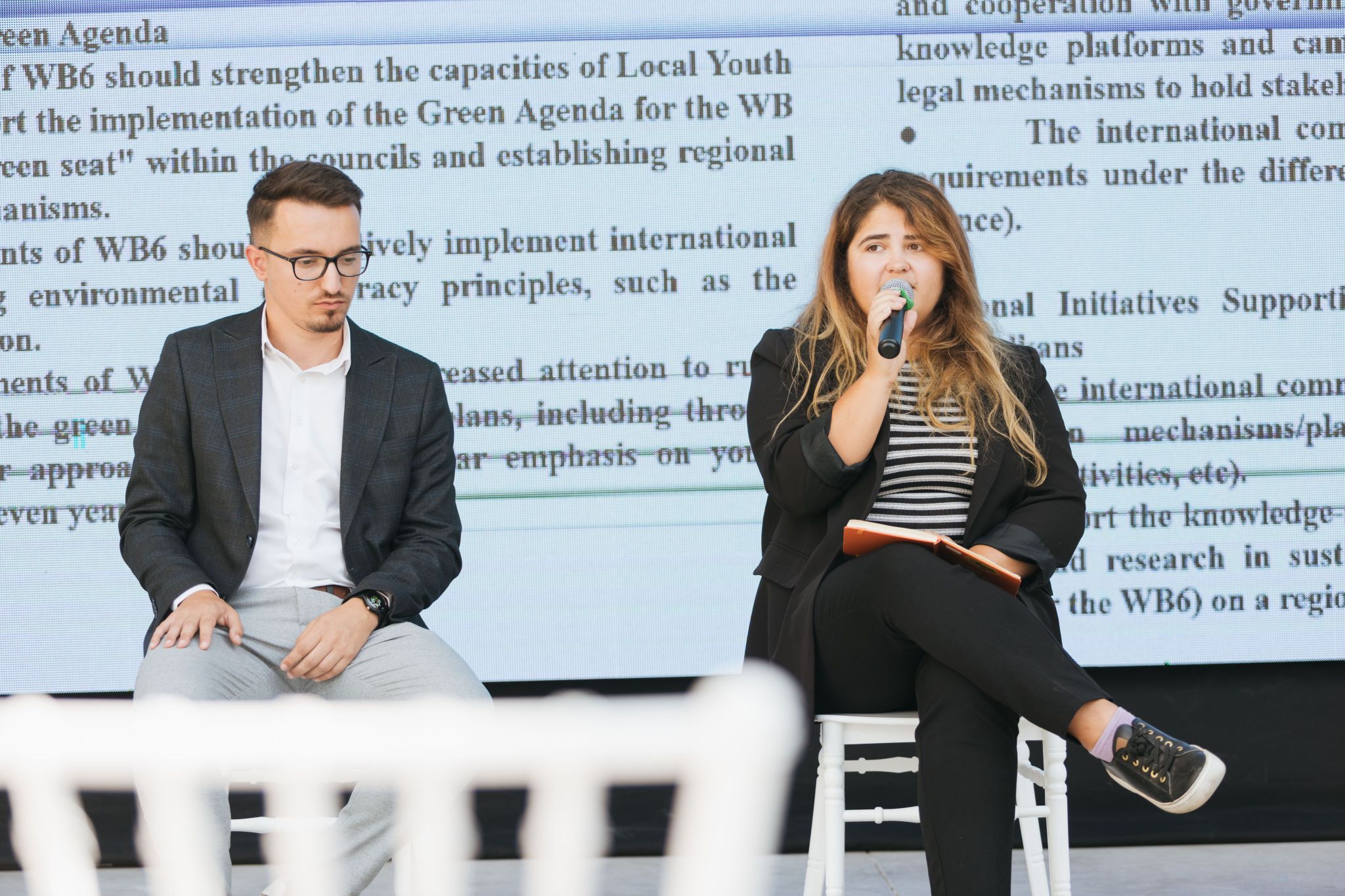
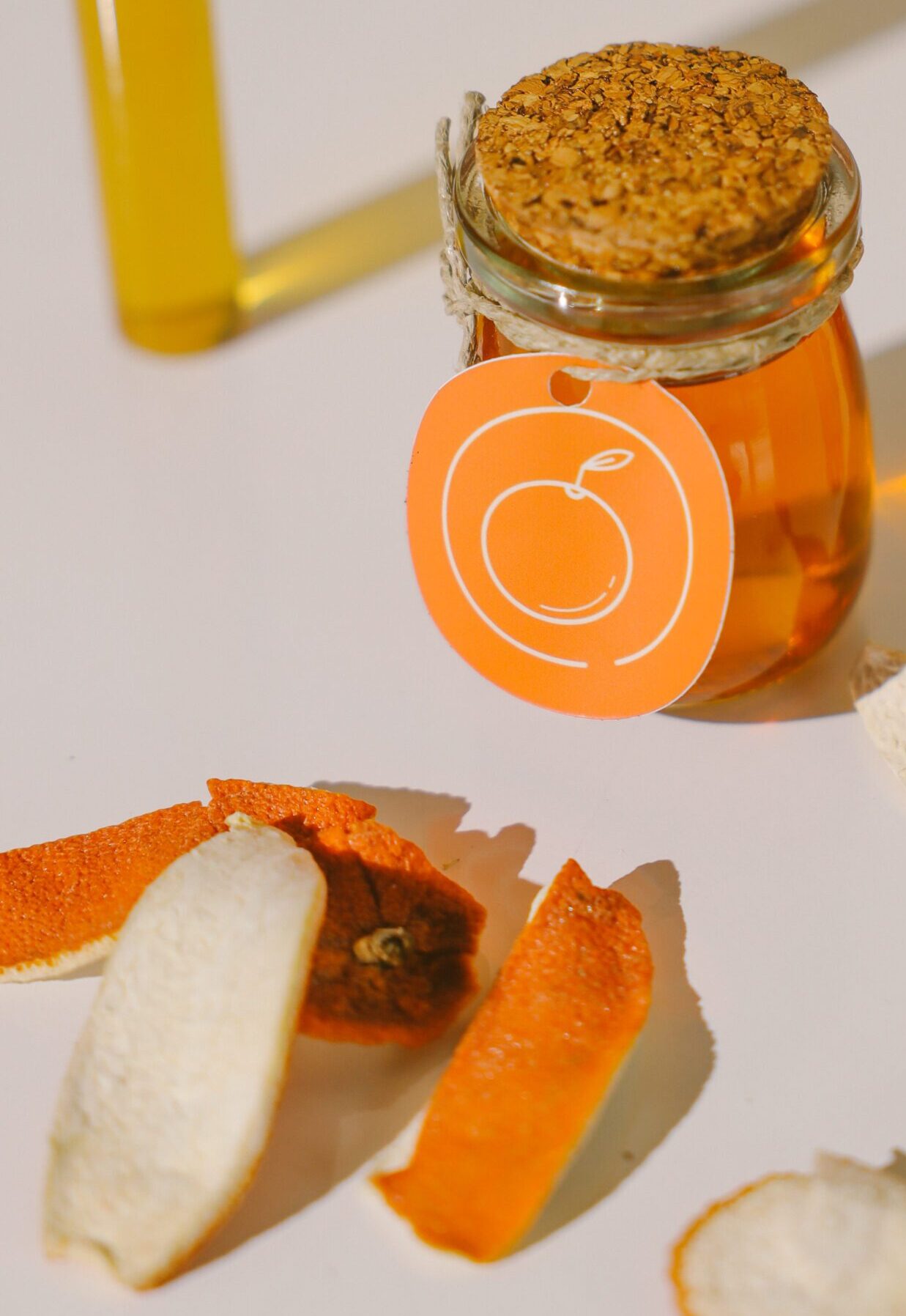
Can you describe yourself, your professional activity, and your social company?
I am Marija Burgieva, I am 22 and I come from Skopje, North Macedonia. Skopje is one of the most polluted city every year, so we knew that it was –among other objectives– important to mitigate that pollution, as much as we can and for what we can have control of. We can only advocate for landfields to be properly used, and for people to stop driving their car. So working on biowaste became our idea. The social entreprise that I co-founded is Okrug, which is a circular startup that converts orange peels into a lineup of products, such as natural essential oils and natural air fresheners. While doing the social entreprise, we are also students; I’m just finishing my bachelor in international politics and diplomacy. The other team members are also students, but in different categories : Marco is in Law, Lepa is in computer sciences. Other volunteers help us, from all backgrounds. All that gather us together is the empathy towards the amount of waste we create, which is being one of the biggest problem that contributes to the pollution we have in Skopje.
How do you manage to contact the people you work with to lead your activities? Do you meet them on a regular basis?
Unfortunately now we have low capacity, however the fact we have such capacity contributes positively to the climate. We want to have all coffee shops, all restaurants and creators of orange peels as waste to be part of our network. Right now, our production site is located in one part of Skopje, the urban area, so we have such shops around us. We go there on a weekly and bi-weekly basis, depending on how much waste they create. People call us, we give them cotton tote bags in which they separate the waste while working. Volunteers go on bicycle, collect the orange peels, bring it here and put them out to dry. We also wash the tote bags and give it back to the producers. It’s a sort waste’s circulation. As a token of appreciation we also give them natural air fresheners that they can use in their toilet, for example. It’s a trade. We are selling the products online, as we don’t have a physical place where we sell the products, the “online green shop”, all products that come from circular social startups are being sold. We manage this platform, it was our initiative during COVID. We wanted to open this platform to have a space where to sell those products, basically we sell them during fairs, which are happening once every 2 months and do person-to-person sales, however, mostly we sell directly and indirectly online.
Also, can you tell us more about your project “Spotlight on my future”, which, as I read, aims to increase youth representation on policy making?
Sure! We had a meeting today about this project –4th July–. It’s an ongoing project, because we’re a youth organization. Okrug was an idea at that time, and we don’t have a legal person to represent it. Because we aren’t a not-for-profit organisation, as we’re a social entreprise, we chose to take the NGO route. Moreover, we’re an NGO created by people under 25, so we were eligible to go to the agency that focuses on youth in North Macedonia. For my former education, it’s for policy, but I want to connect my climate justice activism and my social entrepreneurship with this formal side of my life and go working on climate policy.
In 2018, North Macedonia passed a law on youth participation and youth policy, but unfortunately the local governments are not very responsive right now. We want to mobilize youth to be more active in asking for accountability to these local governments. According to the law, there is supposed to be a youth council in every municipality in all over North Macedonia. Moreover, 2 seats in the actual municipal counsel. They would represent the needs of the youth, what we want to have and what we want to do. However, the deadline to be elected was on last year, and only 46% of the municipalities established such councils. The political is tricky but youth is forward thinking. In order for us to have a way to push more on the issues, we want to talk about climate litigation and more jobs for youth. Yes we tackle biowaste, but also youth and employability.
Why would people change their habits regarding the life they’ve been living so far ? So you have to work with people who would inevitably need to go out of their comfort zone.
What aspect of social entrepreneurship linked to sustainable development do you think should be further promoted in North Macedonia?
Only the youth knows about what SDGs [Sustainable Development Goals] are, unfortunately we are the part of demographics that is not listened to enough. We need to work on raising the awareness on what social development goals are and how to achieve them. What Okrug started to do is to target elementary and primary schools in Skopje to raise awareness to children about the amount of food waste they create, it’s called “Do good, Safe food”. Due to a lack of knowledge, a gap is created in self sustainability of people, and if you don’t have such self-sustainability, you cannot make it develop regarding the community. We started working on increasing the awareness with the youngest generations, but during the visits, professors are actually the ones who have this “revelation moment”.
What social entrepreneurship does is being the “golden opportunity” for youth. On one side it gives you a job, but also means to contribute to the community. For youth, and especially marginalized youth, the one impacted by the negative social problems, it’s a way to give an answer to their everyday life problems. Of course, we have to solve this issue of financial independence. Our full organization name is “Center for Social Entrepreneurship and Sustainability [Центар за социјално претприемништво и одржливост]”. We see social entrepreneurship as a sort of a solution for youth possibility that creates a ripple effect and does more than just profit.
For example, like carbon positive business ?
Yes, or even social. Yes, we focus on the environmental side, but we also aim to have an impact on the social one, like helping disabled people and supporting marginalized and minor categories of people. Others are working with stray animals. The problems are everywhere, so it’s a matter of young people to map out a single problem to which they can find a solution, for giving an answer to the kind of social enterprise they want to create.
Speaking of minority groups, do you have any marginalized people or any geographical area you would like to focus on to promote your activities?
I’m a marginalized youth, I’m a child of what we call a “diverse family”, a child of a single parent family. We are considered a marginalized community. I’ve made my mission to help children who are also from “diverse families”. There is another NGO called “youth for diverse families MK” that we work with to create internships’ opportunities for these children and teenagers.
Since 2018, there’s been a big jump on aid given to social enterprises. There is a huge gap from the lack of social entrepreneurship that there was, and the systemic support we have nowadays. As I mentioned, youth with disabilities have led many initiatives, such as doing jewelry, which is the most basic one in this area. We have also supported another initiative in Veles, next to Skopje, where youth with cerebral palsy create vases with clay.
Another social enterprise I’m from is my mother’s. Actually, one of my main motivation is my mother, she was the first one to start such entrepreneurial initiative in North Macedonia, as she was a mentor to the RISE participants in the area. She targets biowaste as a whole and employs single mothers. Her business is to compost biowaste and create substrate for different types of plants. What we did was collaborating with vases made by children, and gave them substrate for growing plants in the pots. Then we helped them post those vases on platforms for selling those products.
I would say they’ve been more successful than us, and I’m very proud of them and happy to see their development. Additionally, lots of RISE Alumni have been collaborating with us, in many different areas they target. Some RISE participants this year have been targeting people with gluten allergy, people who’ve not been yet finding a solution. There are lots of different possible examples I can give you in North Macedonia, even if it’s not big. Overall, it’s nice to see this growth that I witnessed throughout the years, as COVID gave people time to think about their project and what to concretely do with it.
What social entrepreneurship does is being the “golden opportunity” for youth. On one side it gives you a job, but also means to contribute to the community. For youth, and especially marginalized youth, the one impacted by the negative social problems, it’s a way to give an answer to their everyday life problems.
Regarding your experience with promoting environmental protection, what is an issue you faced during the finalization of your project, whatever it can be?
An issue that we want to talk about is the lack of law on social entrepreneurship. As I said, we registered as an NGO but the idea was to have a social enterprise; even if they have similarities, they’re not the same. We are a business, we focus on financial sustainable enterprise; an NGO relies on donors’ participation. This lack of option to register as a company was a setback for us. Was it better to registrate as a corporate business ? –Which we’re not– or as an NGO ? Many social entrepreneurs face this issue right now. We have been already part of few focus groups with the Ministry of labor and social policy, talking with them; It’s what we’re working on but unfortunately the process is very long.
This has discouraged a lot of people to move on and advocate for this. We are in a situation where we don’t know what to do, we want to skill up this business but we lack investors, since its nature is not recognized. If we had to skill up, we would open another legal person, for us to have this space and welcome investors. Also, if we had such law we would get allocated funds by the government. We could be funded that way.
Also, every business and public authorities cannot agree on a proper definition of social entrepreneurship. This create a huge confusion on what it can be, actually most of the NGO sector cannot agree on this, some think that such enterprises cannot sell goods, because such must be treated as a social cause. It is not what it is, we want to be sustainable, but not only for profit but also impact. We have this lack of uniformized definition. It’s a very new thing, it’s been around for few times now.
I know that in RISE, we lack to give a unanimous definition of social enterprise, regarding what laws of Western Balkans 6.
It’s very new, circular startups are new. This type of business is new to the world, and it’s normal not to have an uniformized definition of it. There’s a good explanation of it, you can metaphorize it like “a mermaid”. Half of the body is human and you know what this is, but the bottom part is something that you don’t understand. Human part is a business, but our specificity is that when you buy, consume and are done consuming it, you don’t have a negative impact. It’s a whole new concept of thinking, people are not used to this type of consuming. Conventional consuming is about the comfort, commodity. Why would people change their habits regarding the life they’ve been living so far ? So you have to work with people who would inevitably need to go out of their comfort zone. If you’re used to buy cow milk, why would you drink almond milk ? Same with water and plastic bottles. It’s also egoistic but, why would people bother about the oceans’ pollution whereas Macedonia doesn’t even have a sea? This is tough to change, but it started changing.
Everyone should just acts like a drop in the bucket. You might not see the impact, but if you start changing, you’ll become one drop in the sea. The regular thing to do for citizens in Skopje is to change their mindset. I would say the same in Western Balkans.
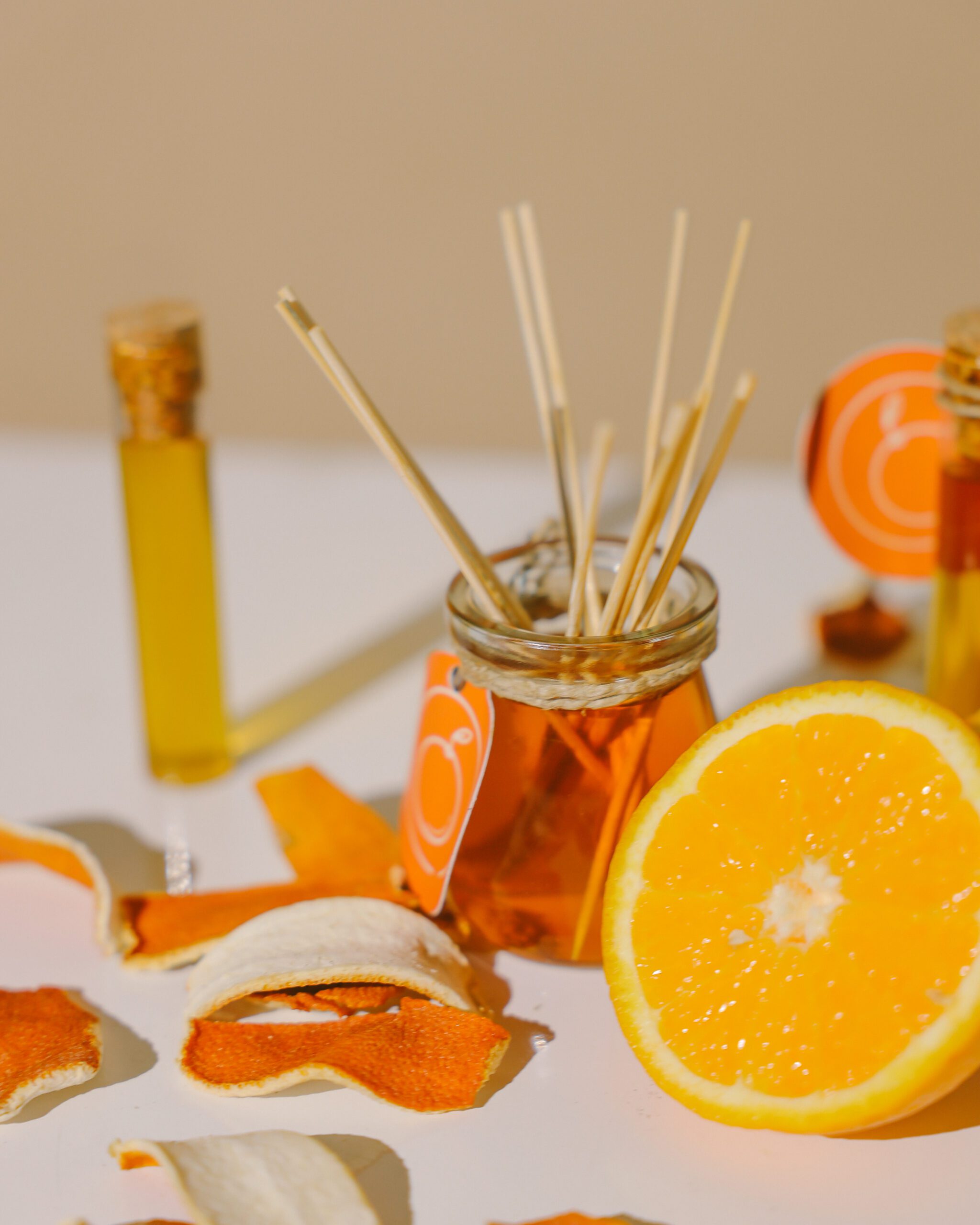
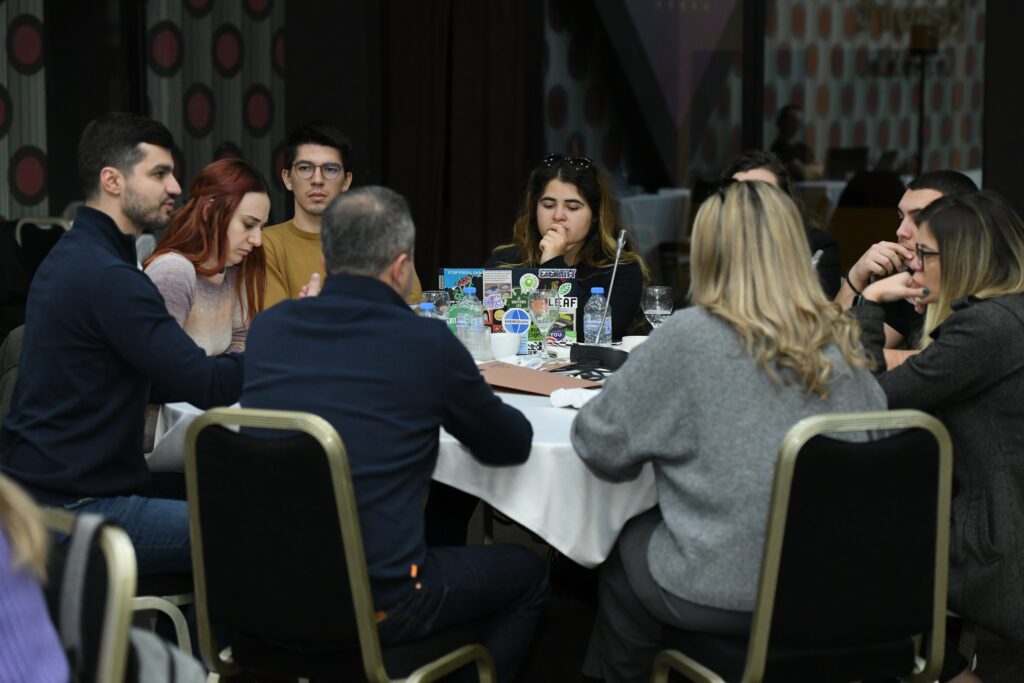
What are your next plans for Okrug? would you consolidate the things that you already implemented or will you try to find new horizons for it?
Okrug is starting the production season again, we’ve collected the waste so far and now we have enough peels to start it. We bought equipment thanks to the fact we won the Regional competition of Balkan Green Ideas [program that supports the development of local and sustainable small green ideas in the Balkans, Editor’s note].
Using those funds, we bought the machinery and a bicycle for doing the collections. From there, we managed to grow a bit on our mechanisms, how we collect the waste and do the packaging, which we renovated. Now, we organized the space of the place where we do our production. We also cut rosemary, we can compost it, nearby, but also throw it there and dispose it for close containments space. Actually, since we had the equipment to make oils, and rosemaries make a great one, we turned it into essential oil. Of course, we gave the leftovers to Mama Organa, my mother’s company, so we have minus waste.
Then we did sort of blends from orange and rosemary essential oils, as we did with lavender last year. We are now working on mixes of fragrances. Moreover, rosemary’s oils is an efficient mosquito and bugs repellent. We would like to do it more effective. It works well right now but we don’t know if someone is going to get allergic, so we’re focused on new options.
Skopje also became the European capital of culture for 2028, so we will work on promoting our activities for that date, intertwined with the city’s cultural activities.
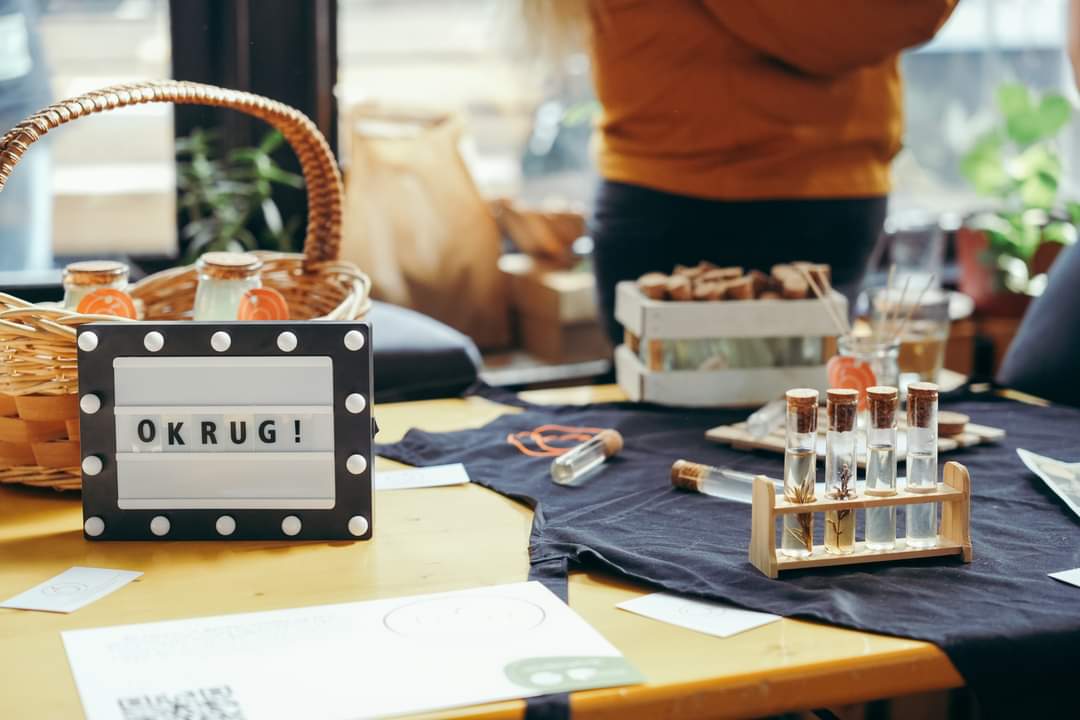
We would also like to certify our products, but we have to send them to Switzerland or France, since none of the western Balkans have those labels. Then we need an Eco certification from the EU. We have to do it, but it is expensive. We know the products are good and of a great quality, but in the end, we’re cannot legally sell certified organic product. We still say it’s a fully natural product, but cannot certify it.
And by going around regarding our status after few years, we are quite tired and don’t see the effects. Still, we keep ourselves motivated. Okrug so far has saved 18 m^3 of CO2. It was 12 tons of orange peels that did it, we have those statistics that keep ourselves motivated. Here we are, working and trying, making an effort. We also motivate other people to apply to RISE and other social entrepreneurship initiatives, we help them with the application processes etc.
